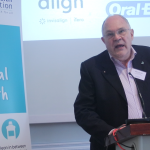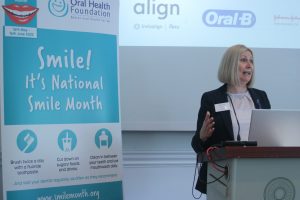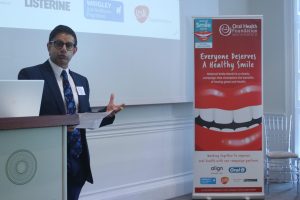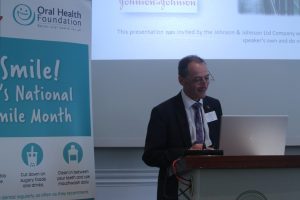Dental teams are in the ideal position to identify and act on early signs of eating disorders, says the Oral Health Foundation
Around 1.25 million people in the UK are affected by an eating disorder and many can be recognised by a range of common problems in the mouth.
Around nine-in-ten (90%) patients with bulimia and one-in-five (20%) with anorexia suffer from enamel erosion. Tooth decay, sensitive teeth, dry mouth and enlarged salivary glands are also frequent.
The Oral Health Foundation believes that thousands of undiagnosed eating disorder can be picked up during regular dental check-ups by dentists, dental hygienists, therapists, and dental nurses.
Chief executive of the Oral Health Foundation, Dr Nigel Carter, says: “During the routine dental examination, dental teams carry out checks on the hard and soft tissues of the mouth and look for signs of tooth erosion. They will also look for possible injuries to the mouth which could have been induced by inserting foreign objects that cause a person to vomit.
“The UK needs a far better strategy for diagnosing eating disorders early. The sooner an eating disorder is suspected or recognised, then the more effective treatment will be. This treatment extends far beyond any damage caused to the mouth. It is also necessary to instigate wider medical referrals to those who specialise in treating eating disorders.”
In the UK, around 275,000 people suffer from binge eating disorders, 235,000 have bulimia and 100,000 are diagnosed with anorexia.
Those who purge through vomiting often suffer from enamel erosion and those with binge eating disorders may have an increased risk of tooth decay and tooth loss through excessive sugar consumption.
The lack of vitamins and nutrient deficiencies associated with eating disorders can also cause the body to shut down and not function properly. This will also be reflected by signs in the mouth.
“As well as erosion through stomach acid, dental teams will also be able to detect conditions such as tooth decay, from excessive sugar consumption and signs of nutrient deficiencies,” adds Dr Carter.
“If they suspect that a person might be suffering from an eating disorder, they will be able to talk calmly through the clinical signs they are seeing in the mouth. They might also speak about prescribing a high fluoride toothpaste or varnish to protect your teeth from decay.
“The more open and honest patients can be with their dental team, the better they will be able to help. Your dental team can be trusted to help you and will not judge you over any symptoms you are having.”
The Oral Health Foundation is currently running National Smile Month – a campaign that champions the importance of having good oral health. During the campaign, the charity is keen to support those with severe oral health needs and improve awareness and information about the health of the mouth.
Brooke Sharp is a Clinical Advice Coordinator at Beat, the UK’s eating disorder charity.
She says: “Eating disorders impact around 1.25 million people in the UK of all ages, genders and backgrounds and you cannot tell if someone has an eating disorder by looking at them. This means that eating disorders can go undetected for a long time. However, physical signs of an eating disorder, such as dental erosion or sensitivity can occur, mean that dentists may be among the first to observe the signs and symptoms.
At Beat, we are currently working on a webinar series to educate different health sectors about health, which includes dentists, dieticians, and pharmacists. The aim of this training will be to help professionals identify the signs of an eating disorder and understand how to support their patients. However, whilst it’s important to increase awareness of eating disorders, it is never the role of dentists to diagnose or treat the eating disorder, and patients must always be signposted to specialist support.”
Tina McGuff is a mother of four children and struggled most of her life with anorexia and obsessional exercise behaviours. She has fully recovered and lives a healthy life, even writing a book to help other people who are going through the same struggles. Currently, she is helping to educate others on mental health and how to cope with different needs. It can be hard for dental teams to broach the subject with those who are suffering from eating disorders.
Tina says: “I could see the impact it was having on my oral health, and I was eventually hospitalized in a psychiatric ward as a teenager. There were a lot of problems with my teeth even at that time because I was sick all the time.”
Constant stomach acid on teeth can erode the tooth’s enamel. As the teeth are weakened, it is also important not to brush straight after being sick as this could further damage the teeth. Instead, simply rinse with water or use a safe fluoride mouthwash recommended by your dentist.
Tina explained that she assumed the dentist would simply be able to fix everything at the end of her struggle and that it would not impact her dental health going forward. “It is so good that awareness is now being raised as to how eating disorders can impact your mouth,” Tina adds. “All the sugary things I was taking to try to get back into normal eating meant that my teeth were always being attacked.
“I was aware of oral hygiene. I did brush and floss my teeth. I also wasn’t probably using the right products with the correct amount of fluoride. It felt almost futile, but I did it because it was the only right thing I could do.
“The most interesting thing is that when I did go to the dentist, which I did a lot when I was younger, was that not one dentist ever said anything to me. It was only this last year that the dentist sat me down and said I have some concerns with the pattern in your mouth – do you have an eating disorder? It was so sad he was the first one to ever ask. Someone must have spotted and seen, but no one person ever said anything, and it would have been a great opportunity to have that discussion.”
Tina is currently pushing for more research into how best to help patients with eating disorders. This could be a great step forward for the wellness of those who struggle with eating disorders.
Rhian Lovell has a long history of eating disorders. She is 39 years old and living currently in South Wales. Rhian says: “The longest-lasting legacy of my eating disorder is my teeth. I have spent probably the best part of £6,000 and lost five or six teeth. I am going to get dental implants for the teeth which are missing. While I was unwell, I did try to take care of my teeth but when you are vomiting multiple times a day that is going to have a long-term impact.
“When you have an eating disorder, self-care is not very high on your priorities. I probably didn’t brush all the times when I should have.
“The dentist I registered within Cardiff when I was eighteen is still my dentist to this day. The worst part before I had my treatments was having constant infections in my mouth, I was lucky because he was always at the end of the phone for me. Even now it is over an hour’s drive away, but he understands what I’ve been through, and he understands how to encourage me and what advice to give me.
“My advice for dental teams is to try to approach it sensibly and sensitively. If there is a decline in dental health there is, of course, a reason for it and I don’t think it is unreasonable to have the conversation like that. It was a bit of a relief for me for my dentist to know why my teeth were a mess. I knew I wasn’t taking care of my teeth, it almost made it easier for me to deal with. My teeth still frustrate me, but they look okay now, and they work.”
The Oral Health Foundation urges anyone with an eating disorder, or family and friends with eating disorders, to get help reach out for support. Both Tina and Rhian volunteer for Beat, the UK’s an eating disorder charity that strives to help people overcome their problems supports people affected by eating disorders. Beat’s helpline is open 365 days a year on 0808 801 0677 or via beateatingdisorders.org.uk. You can find more help here at https://www.nhs.uk/nhs-services/mental-health-services/ for information and support.
 Speaking of her determination to remain mentally and physically healthy in the thick of her battle with cancer, Mrs Liesching-Schroder said: “I just needed to run. Control was being taken away from me by cancer and this was one way of getting control back. When it came to the end of radiotherapy, I had the goal that I wanted to run the Southend half-marathon. I was told by clinicians that I wouldn’t be allowed to do it. But nobody could stop me. It’s what’s keeping me going and I have to do this. Running was my way of being free from it all.”
Speaking of her determination to remain mentally and physically healthy in the thick of her battle with cancer, Mrs Liesching-Schroder said: “I just needed to run. Control was being taken away from me by cancer and this was one way of getting control back. When it came to the end of radiotherapy, I had the goal that I wanted to run the Southend half-marathon. I was told by clinicians that I wouldn’t be allowed to do it. But nobody could stop me. It’s what’s keeping me going and I have to do this. Running was my way of being free from it all.”



















